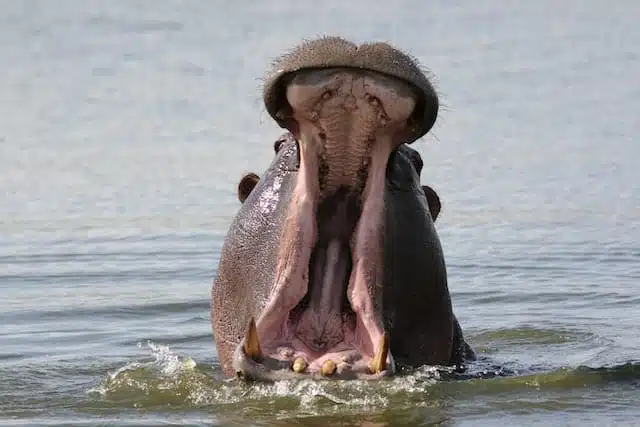Elephant vs. Hippo is the right matchup when you think about them. After all, both animals hold respective titles of the first and third largest terrestrial animal.
One is much larger than the other, though, and they have very different diets and lifestyles. But, believe it or not, these two animals have some surprising similarities.
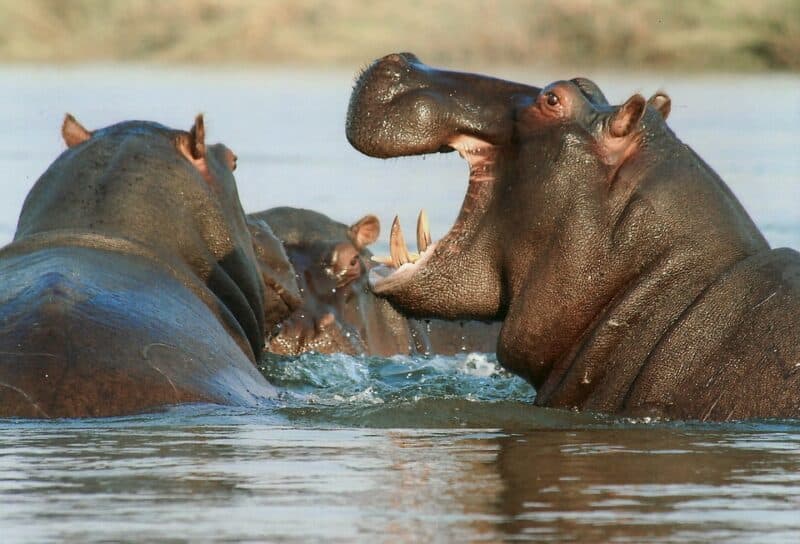
In this article, we’ll be exploring the differences and similarities between elephants and hippos so that you can get a better understanding of these majestic creatures.
Contrasting the Elephant vs. Hippo
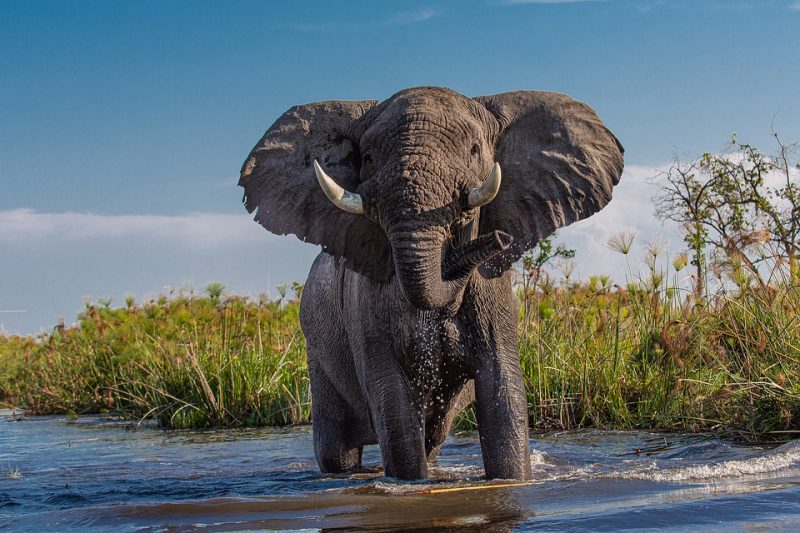
Before we dive into elephant vs. hippo differences and similarities, let’s take a quick look at each animal.
Elephants are the number one largest land mammals on the entire earth, with the African bush elephant being the largest elephant species. Other elephants are the African forest elephant (second largest) and the Asian elephant (smallest). They are the only living members of the Elephantidae family, which includes historic mammoths.
They have thick gray skin and impressive tusks and are well-known for their intelligence, social behavior, and kinship value.
On the other hand, hippos are semi-aquatic animals living in rivers and lakes. They are much smaller than elephants and have thick, rubbery skin and short, stubby legs.
Two species of hippos exist: the common and the pygmy hippopotami. The common hippo is more well-known and inhabits East Africa. The lesser-known pygmy hippo inhabits West Africa and is much smaller.
Hippos also have a reputation for being aggressive and for being able to stay underwater for long periods of time.
Physicality and Appearance
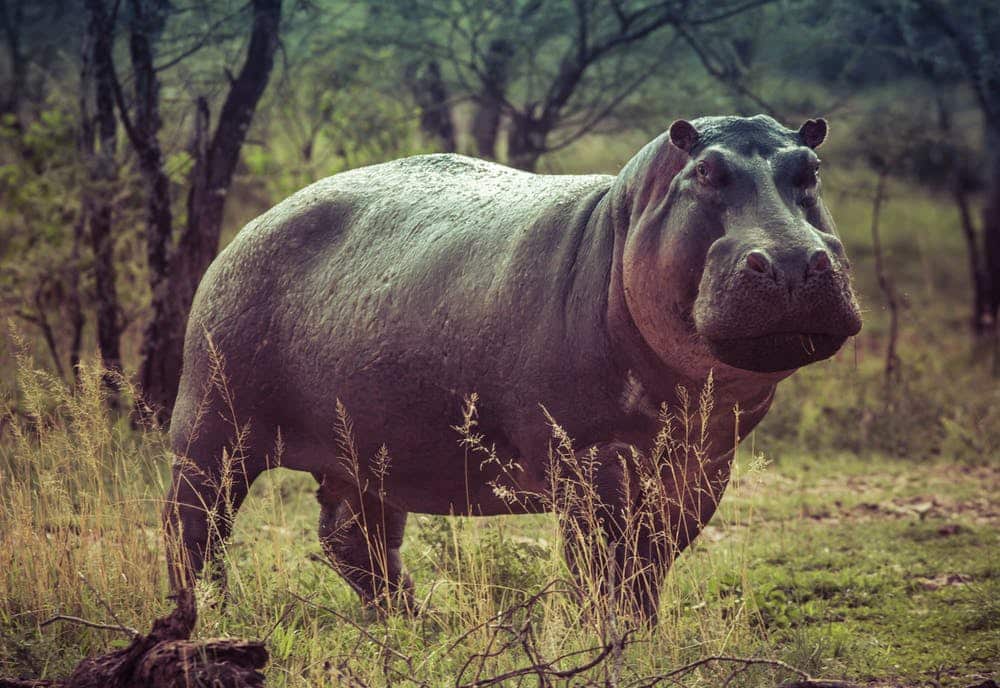
The first noticeable difference between elephants and hippos is their size. Elephants are the largest land mammals in the world, weighing up to 6,000 lbs, while hippos are much smaller and typically weigh around 3,000 lbs. Male elephants are remarkably bigger than female elephants, but the Hippo lacks sexual dimorphism, and it can be hard to tell males and females apart, especially in water.
Elephants have thick, gray skin covered in hair, while hippos have thick, rubbery skin that is almost hairless. A critical difference between the two animals is their tusks; elephants have curved tusks, while hippos have stubby tusks.
Another distinguishing feature of elephants is that they have large ears, a long proboscis (trunk), and tusks as long as 6ft. Its large ears are used to cool down and maintain body temperature but can also be used for communicating between herd members. The tusk is an extension of the incisor and is used as a tool for digging, pushing heavy objects, and peeling tree bark. It can also serve as a weapon when defending against attack.
The elephant’s trunk is primarily used to breathe, but it can also gather food, hold water, and pull objects. It can hold up to 8.5 liters of water and is also four times as sensitive as the nose of a bloodhound. Of all elephant species, the African Bush elephant has the most extended trunk, longest tusk, and most enormous ears. Their backs also curve inward compared to their Asian counterparts, which have humped backs.
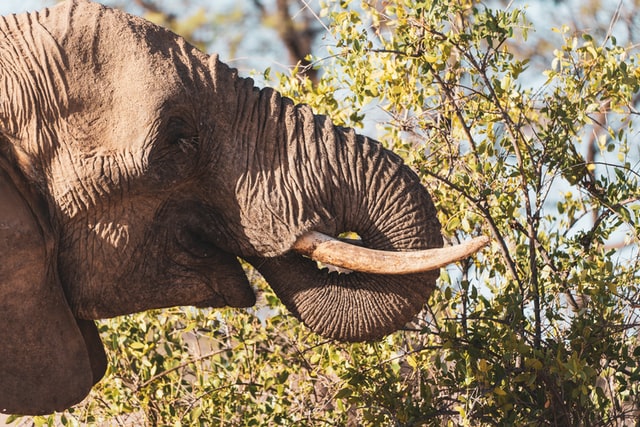
Hippos, on the other hand, stand out for their barrel-shaped bodies, canine tusks, and wide mouths, which can open at a 180-degree angle. Although they may look vaguely similar to pigs, their oldest existing relatives are cetaceans like porpoises, whales, and dolphins. The Hippo’s eyes, ears, and nose are placed on the top of its head so it can easily stay in the water and keep its head above to watch for predators or invaders.
They also have webbed feet for easy maneuvering in water and on land, but they don’t swim. Instead, they stay in shallow water where their legs can reach the bottom or bounce off the riverbed in deep water. Even though they don’t swim, hippos can hold their breath underwater for up to 6 minutes. They can also sleep while fully submerged under water coming unconsciously for air without waking up.
Much like elephants, hippos have callous skin. However, in contrast to elephants, their skin needs to be constantly kept moist to avoid dehydration. Hence, hippos secrete a red-colored substance that serves as sunscreen when out of the water, sometimes giving them a red-brown color.
Behavior
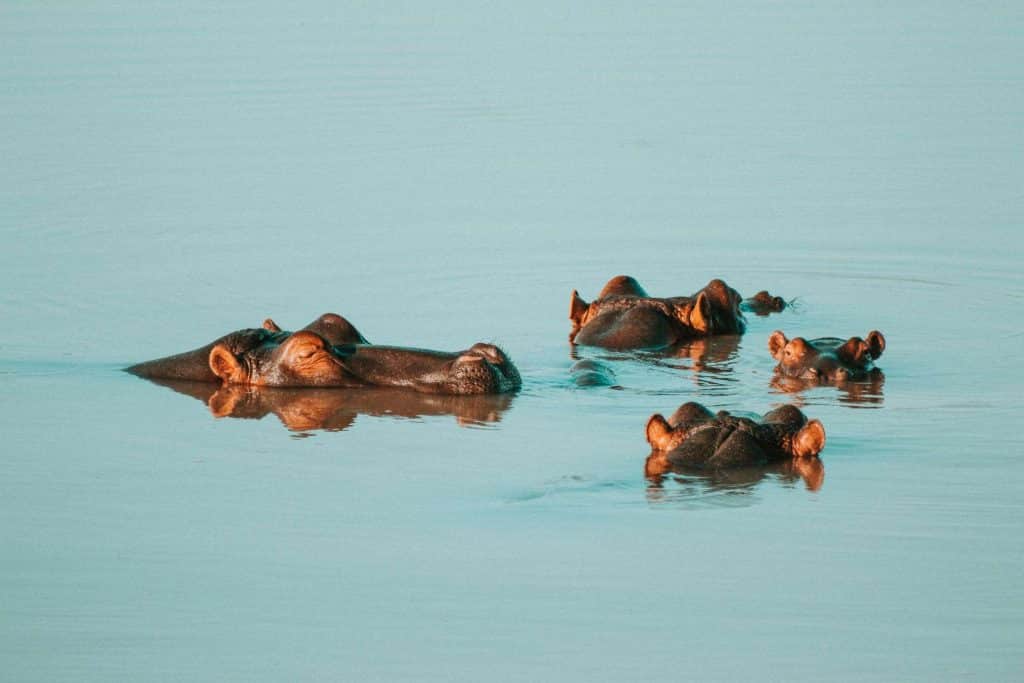
When it comes to behavior, elephant and hippos are different. Elephants are known for their calm, intelligence, and social behavior, and they form close bonds with their family and herd members. They have a strong sense of family and will often help each other in times of need.
Elephants are far more intelligent than hippos as they are one of the few mammal species other than humans that can be self-aware. They are also among the few wild species capable of fashioning simple tools. Although the extent to which elephants can feel emotion is debated, they have been recorded as staying close to dead herd members and even recognizing the bones of other elephants.
Hippos, however, are known for their aggressive behavior, and they often fight with each other for dominance. They are also very territorial and will defend their territory from other animals. On numerous occasions, hippos have been reported attacking humans.
You can’t blame the hippos too much, though; they share much of their habitat with dangerous crocodiles, snakes, and alligators so that we can understand the temper.
Even though they may aggregate in close quarters, hippos have no social bond between groups and barely tolerate each other for their shared need for water. Hippos are also notorious for muck spreading, a behavior where they apply their feces with their tails into the water or on land to distribute it over a larger area.
They don’t use this activity to mark territory, so the reason why they do it is yet unknown. However, some believe that they use it to draw a trail from the land to water after grazing.
If the elephant vs. hippo comparison were based solely on behavior, perhaps the elephant would edge out the Hippo. However, the Hippo sure has its good bits as well.
Habitat

The habitats of elephants and hippos differ significantly. Elephants live in grasslands, savannas, and forests, while hippos live in rivers, lakes, and swamps. Elephants are adapted to living in hot, dry climates and need access to water for drinking and bathing. Hippos, on the other hand, are adapted to living in warm, wet environments and need access to water for swimming and cooling off.
Elephants constantly roam the savanna in search of food and water, while hippos are immensely territorial when in water but mark no land territories.
Even though hippos spend most of their time in the water, they are not very good swimmers. Hence, they are primarily found in shallow water bodies where they can quickly bounce off the bottom of the waterbed.
Contrastingly, elephants, which are predominantly land animals, are natural-born swimmers. Their trunks function as a snorkel so they can remain submerged underwater. If the chance arises, they may swim for hours. Swimming helps elephants cool down and feel weightless, relieving joint and muscle strain.
Diet
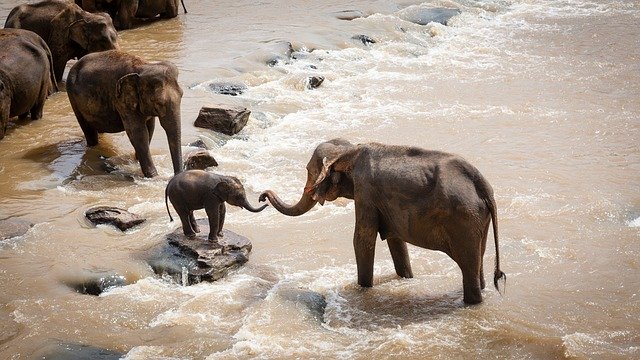
The diets of elephants and hippos are also very different. Elephants are herbivores, meaning they eat only plants. They feed on grass, leaves, bark, and fruit, and they can consume up to 300 pounds of food per day.
Because a majority of the seeds and nuts eaten by elephants go undigested, their dung usually serves seed dispersal in forests. It also serves as food for microfauna, such as dung beetles.
Contrastingly, hippos are omnivores, meaning they eat plants and animals. They primarily eat grass and aquatic plants, but they also eat small animals such as fish and frogs.
During the day, hippos may stay in the water and feed on grasses growing by riverbeds. Yet, they mainly feed in the hours between dusk and dawn and can eat the foliage of up to 90 lbs per night. They provide within this period to avoid the hot conditions of the sub-Saharan Savannah but are at risk of getting preyed upon by nocturnal predators.
Social Group
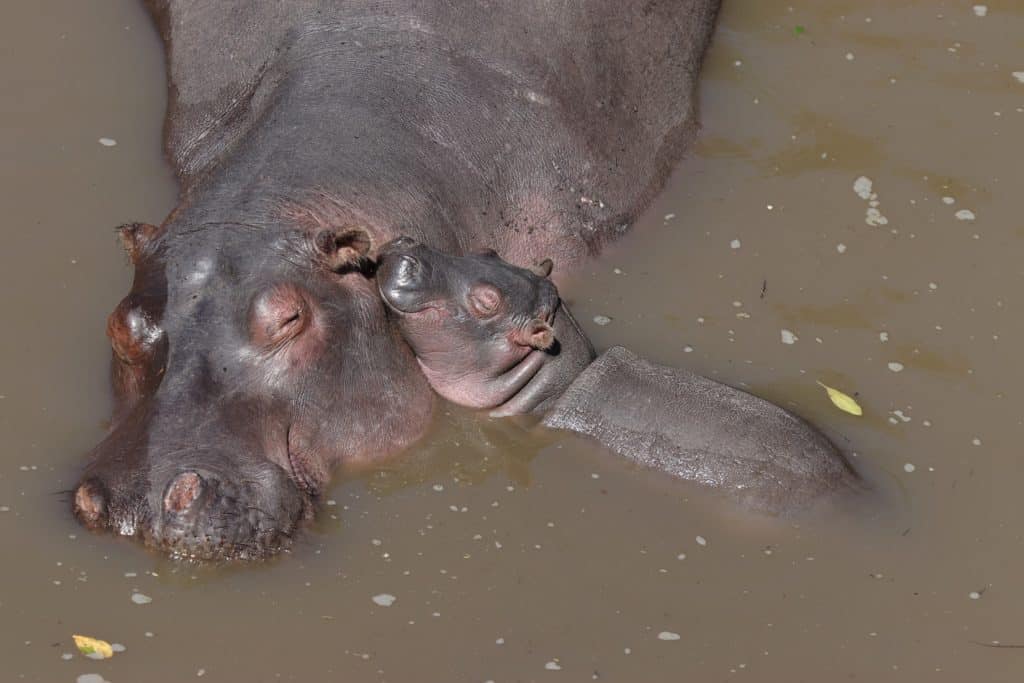
The social groups of elephants and hippos are also quite different. Elephants live in large family groups or herds led by a matriarch, and they have very tight bonds with each other. The members of the flock will help each other in times of need and protect each other from danger. As a male elephant matures, he leaves the herd to go solo or may join up with other bachelor elephants in the vicinity.
Hippos, however, are much more reclusive. They will come together in large groups to feed, but they are usually solitary animals, and they don’t form strong bonds with each other.
Mating
When comparing mating strategies between the elephant vs. Hippo, no one can hand the silverware to either animal, as what works for one specie may not necessarily work for the other.
That said, male elephants are very aggressive when aroused. They enter a period known as musth, where they secrete a substance from their temporal glands. Even male elephants in captivity need to be handled gently during this short period to prevent aggression.
A copulation between elephants lasts for barely one minute, yet the elephant’s gestation period is the longest among mammals. They carry their young for two years before giving birth and rarely give birth to more than one at a time.
In the case of the Hippo, copulation is less predictable, and it happens in water. The bull mounts the cow, and she remains underwater during this short period, only coming up for occasional gasps of air.
Gestation in hippos lasts for eight months. But similar to the elephant, they only give birth to one calf per pregnancy. Mothers can get extra aggressive during this nursing period because, unlike the baby elephant, which has the herd, the young hippo calf has only its mother to protect it.
Conservation Threats Facing Elephants and Hippos
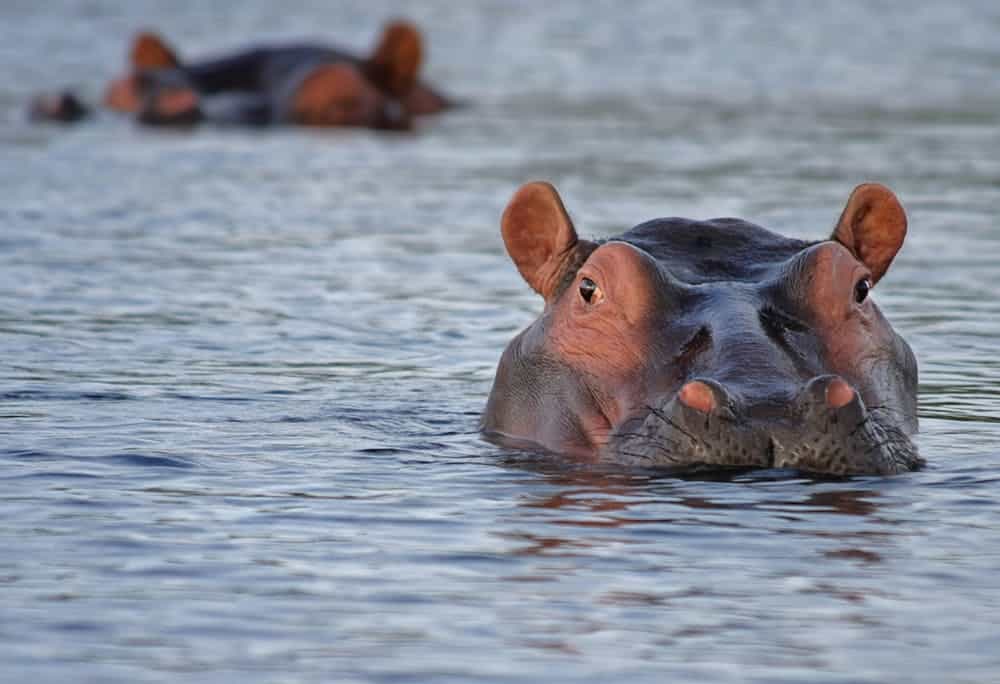
Human activities have put both elephants and hippos at risk of extinction. This section is not much of an elephant vs. hippo contest but a survival battle because they are both losing the conservation fight. However, you can argue the elephant has had it worse as the IUCN lists it as critically endangered while the Hippo is listed as vulnerable.
Poaching is a significant threat to both species, as ivory from elephant tusks and hippo teeth is highly sought after on the black market.
Habitat destruction is also a significant threat to both species. Elephants need large areas of grassland and savanna to survive, and hippos need rivers, lakes, and swamps. As human populations grow, these habitats are being destroyed, leaving both species with fewer places to live and thrive.
Finally, the illegal wildlife trade is a significant threat to both species. Elephants and hippos are illegally trafficked for their meat, tusks, and teeth, and this has put their populations at risk.
Similarities Between Elephants and Hippos
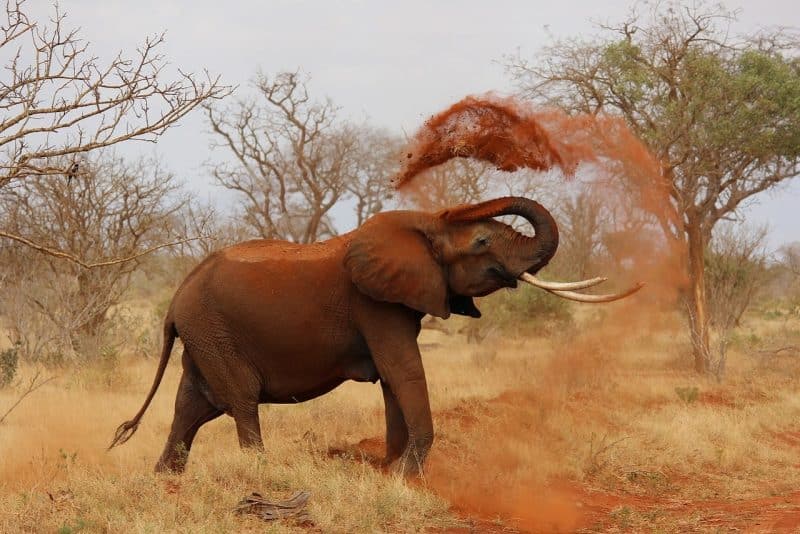
Despite their differences, there are also some surprising similarities between elephants and hippos. One of the most apparent similarities is their skin. Both animals have thick, rubbery skin that is well-suited to their respective environments. Both animals also have a fondness for water and enjoy swimming and playing in the water. They are also both capable of aggression and will fight off predators or other animals if threatened.
Conclusion
There are some surprising similarities and differences between elephants and hippos. Both animals are majestic creatures, and they are both well-suited to their respective environments. However, their diets, social groups, and behaviors are quite different.
So, the next time you see an elephant or a hippo, take a few minutes to appreciate the unique characteristics of each animal. Elephants and hippos are two of the most impressive animals in the world, and learning about their differences and similarities can help us better appreciate them.
So if you’re looking to learn more about these incredible animals, I hope this blog post has been helpful.
If you want to see more Animal Comparisons, also have a look at Gorilla vs. Lion.
Join our Forum for free today!

- These are The 5 Largest Great White Sharks Ever Recorded - July 19, 2024
- The Surprising Benefits of Big Game Hunting - July 18, 2024
- $100k+ Hunting Experiences The Most Expensive Animals to Pursue - July 17, 2024

